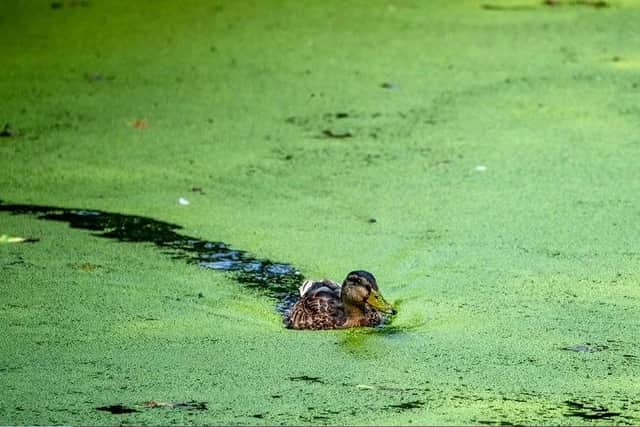Water quality 'improving' on north coast councillors are told after dangerous blue-green algae outbreak
and live on Freeview channel 276
A source says that a senior manager at Causeway Coast And Glens Borough Council has written to all elected members this afternoon to tell them that samples of water taken “at a range of sites are now at an acceptable level” and that red flags will soon be removed from Benone, Downhill, Castlerock, and Portstewart.
No official confirmation of this had been received at time of writing, nor is it clear whether swimming in the area has been deemed completely safe.
Advertisement
Hide AdAdvertisement
Hide AdBeaches in an area stretching from at least Portstewart in the east to Benone in the west have been affected at one time or another over the past few days.


Castlerock was the latest confirmed outbreak site, with positive results emerging late on Sunday night on samples that had been taken on July 5.
Blue-green algae is officially called “microcystis sp” and, bizarrely, it is not algae at all.
Instead it is a type of bacteria (specifically, a cyanobacteria).
Advertisement
Hide AdAdvertisement
Hide AdThe NI Environment Agency (NIEA) describes it as “potentially toxic” and has advised against swimming in the area, with red flags being flown in some of the danger zones.
Such blooms are most common during May to September.
Alongside sunlight, the life-form also craves slow-flowing or still water and nutrients – principally nitrogen and phosphorus, which can come from run-off from fields where fertiliser is used, and from sewage.
The clumps of bacteria can cause skin rashes and eye irritation if touched and make you sick if swallowed with vomiting, diarrhoea, fever and pains in muscles and joints.
For some wildlife and pets it can be potentially fatal.
The blooms also hoover up oxygen, which can suffocate fish.
According to the UK Centre for Ecology and Hydrology, there have been several outbreak sites in Northern Ireland during June and July – all in and around the River Bann system.
Advertisement
Hide AdAdvertisement
Hide AdThey are at sites in north Lough Neagh around Toome, at Antrim town shoreline, in Craigavon Balancing Lakes, and in the north River Bann and along the north coast where the Bann empties into the sea.
Pet health charity Blue Cross says: “Exposure to toxic blue-green algae is often fatal and it can cause long-term health problems in dogs that survive.
"Concentrations of the algae vary throughout the year, but it's best not to run the risk of allowing your dog to come into contact with water where the algae may be present.
“Some types of blue-green algae can cause symptoms, or become fatal, just 15 minutes to an hour after a dog drinks contaminated water.
Advertisement
Hide AdAdvertisement
Hide Ad"If your dog shows any of the following signs after drinking from, swimming or paddling in water, contact your vet immediately and tell them you are concerned about blue-green algae:
“Vomiting (being sick); Diarrhoea; Seizures or fitting; Weakness, collapse or unconsciousness; Disorientation or confusion; Drooling; Breathing difficulties.
“There is no antidote for the toxins produced by the blue-green algae, but if caught early enough, your vet will likely try to make your dog sick and attempt to flush the toxins from the body before they take hold.
"Sadly, blue-green algae poisoning often eventually causes fatal liver failure.”
The charity says it can affect cats too.
Advertisement
Hide AdAdvertisement
Hide AdFirms in the area had certainly been hoping for a swift end to the algae threat.
DUP Portstewart councillor Mark Fielding likened this time of year to “harvest time” for those who depend on an influx of tourists who flock to the coast around the Twelfth.
"If this can pass over in a couple of days, I don’t think it’ll have much impact on business,” he said.
But the main blooming season for blue-green algae runs until September. So what if it doesn’t?
"Well,” he said. “We try not to think about it.”
Advertisement
Hide AdAdvertisement
Hide AdMeanwhile TUV councillor for the same area, Allister Kyle, had said: “Definitely the triangle [Portstewart/Coleraine/Portrush] seems a lot quieter than what we’ be expecting.
"I’d have been expecting the triangle to be a lot busier on the Sunday before the Twelfth – it’s always busy on the north coast.”
However with the weather having taken a turn for the worse, he said it was difficult to know how much that was a factor.